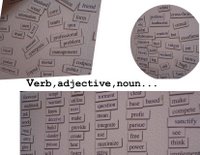Verb, adjective, noun (and sometimes prepositions).
For xmas, Mr Prettiebottom received a magnetic poetry set (Shakespearian english), which will compliment the corporate-speak set (received by Prettiebottom herself a few xmases ago) quite nicely, thank you. Who doesn't like to see "professional" and "management" in situ with "codpiece"? So I was staring at the fridge, wondering how to go about creating magic with these two worlds, but found myself wholly overwhelmed with the sheer volume of words on the fridge. Frightfully inefficient! Heretofor, I seteth upon sorting them grammatically. Verb, adjective, noun - as you will see from the attached schematic. What to do with the hims and Is (pronouns?), abouts, froms, and ins (prepositions? Are you sure?), and most vexing, the wherefores, would, can, coulds (are some of those verbs?)
No, I couldn't have chosen the alphabet--with which I am completely familiar--but instead had to pick a system of which I know the bare minimum of the rules.
[1] Heresois proof that I also knoweth not to split the infinitive, but apparently this only applies in latin and was scrapped from English grammar some thirty or fourty years ago, sayeth Jinki, who knows much about the mysterious workings of speaking English.


4 Comments:
Did you leave this post as bait for me (sigh)? Hims and I are, yes, pronouns. From, in -- prepositions, most certainly. Would, can, could: verbs. Wherefore is a conjunction. About can be just about anything you want it to be.
I just wrote a rant about watching medical programs too close to bedtime on my blog. Not for the faint of heart or those about to go to bed.
Yes, I have to admit there was some baiting involved ... never would have know would is a verb! Like my first year english prof said to me sometimes you'd think english isn't my first language.
It's a modal verb, to be exact.
Man, good to know that ESL training comes in handy in a tight spot.
As far as I can remember (from my one year of Latin, almost 10 years ago), Latin infinitives are expressed in a single word. I.e. (Latin!): "To rejoice" = "Gaudere". All this to say, I don't think you could split a Latin verb, even if you wanted to.
Post a Comment
<< Home